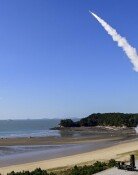[Editorial] Justice Ministers Intervention a Black Mark on Koreas Judicial History
[Editorial] Justice Ministers Intervention a Black Mark on Koreas Judicial History
Posted October. 17, 2005 06:38,
Presidential Chief Civil Secretary Moon Jae-in said yesterday that Justice Minister Chun Jung-bae exercised command authority to protect principles of the law and human rights.
It was democratic control over the prosecutors. It did not undermine the independence of the prosecution. Instead, it protected the prosecutors independence, he argued. However, it may appear to anybody to be far-fetched and not understandable to cite the right to freedom and protection of human rights in order to protect a narrow-minded pro-North leftist who challenged liberal democracy, one of the foundations of this nation.
If the Justice Minister had wanted to exercise command authority to protect human rights, he should have exercised it in other cases, not in this case, which challenges the institutions of this nation and divides the nation.
I would like to ask when this administration and the Justice Minister began to take such a keen interest in protecting human rights. Secretary Moons remarks on the resistance from inside the prosecution against the ministers intervention also are not persuasive at all. It is a rejection of a minister who is not from the prosecution, he said.
That sounds like another manifestation of this administrations tendency to divide the nation. It is dumbfounding that the prosecutions self-defensive instinct to protect itself against interventions that undermine the prosecutors independence can be interpreted that way.
Nobody conjures up independence from suspects, lawyers or courts when the prosecutions political neutrality is mentioned. Political neutrality means being independent from political powers, not being subjugated to the administration, and punishing those who commit crimes against the nation. In that context, the intervention of the justice minister that led to the resignation of the prosecutor general will remain a black mark on Koreas judicial history.
In spite of that, Secretary Moon tried to gloss over the politician-turned ministers putting pressure on the prosecution, saying it was an example of democratic control.
Thats like trying to cover the sky with ones palms.
This series of events confirmed once again that President Roh Moo-hyun, Secretary Moon and Minister Chun are politicians who are obsessed with pursuing individual beliefs or one-sided values, rather than putting forth efforts to achieve national unity and national development. They also appeared to be silly when they created the crisis by shaking up the prosecutions authority and provoked the public to feel jittery due to an unimportant issue like whether to put Professor Kang Jeong-gu under detention or not.
Secretary Moon tried to give some rationale to this series of events, mentioning President Rohs zeitgeist. Is it based on zeitgeist to shake up the prosecution in order to protect a pro-North leftist, instead of taking care of the sufferings and livelihoods of the public who are suffering from economic difficulties? It is the nation and the public who suffer the most due to the distorted perception of the times of an incompetent administration composed of those who dont know the political order of business and priorities, and are not able to coordinate dissenting voices inside the administration.







